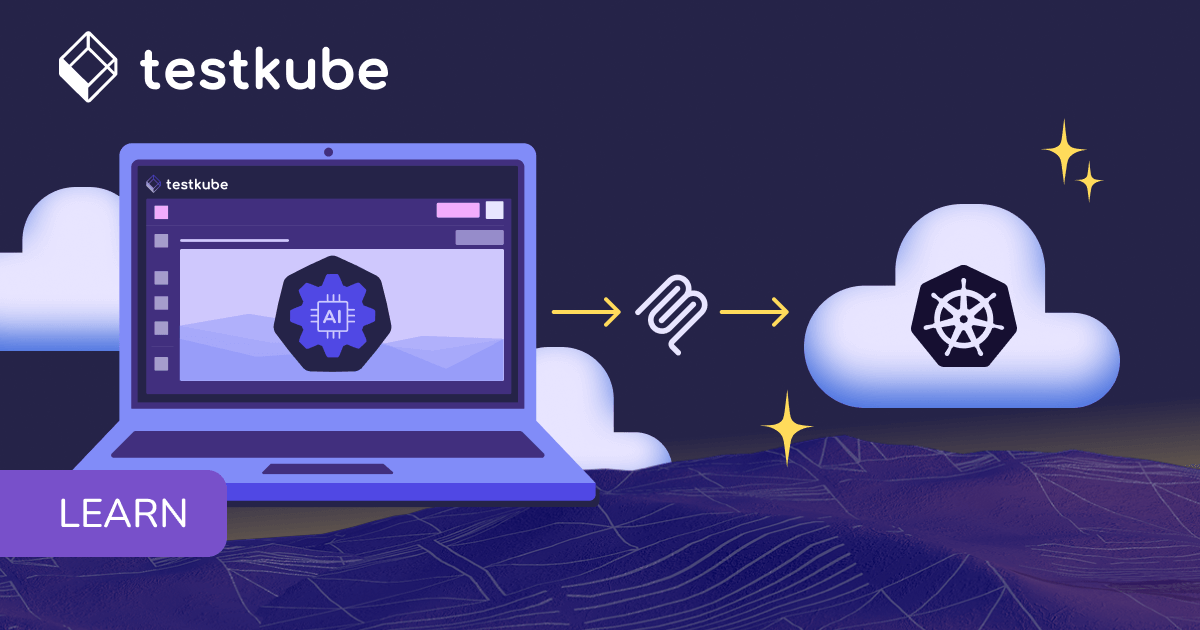

Table of Contents
Try Testkube instantly in our sandbox. No setup needed.
See how to orchestrate YOUR tests with YOUR tools


Table of Contents
Executive Summary
End-to-end testing is a critical part of the software development lifecycle, ensuring that all parts of an application work together as expected. However, when it comes to testing applications in Kubernetes, there are additional challenges to consider. With complex microservices, multiple environments, and dependencies to manage, end-to-end testing in Kubernetes can quickly become overwhelming. In this article, we will explore the challenges of end-to-end testing in Kubernetes and how cloud-native testing tools like Testkube can help overcome them. We'll also cover some best practices and tools to help streamline the testing process and ensure high-quality software.
What is End-to-End Testing in Kubernetes?
End-to-end (E2E) testing in Kubernetes involves testing complete application workflows across multiple containerized services, pods, and clusters. Unlike unit tests that focus on individual components, E2E tests verify that your entire Kubernetes-deployed application functions correctly from the user's perspective.
Tools for End-to-End Testing in Kubernetes
When it comes to end-to-end testing in Kubernetes, having the right tools is crucial to streamline the testing process and ensure high-quality software. There are several tools available that can help teams effectively test their applications, whether it's load testing, behavior-driven development, or JavaScript-based testing.
- Cypress: Cypress is a JavaScript-based end-to-end testing framework that enables fast, reliable testing for modern web applications. It includes a powerful testing dashboard, real-time reloading, and automatic waiting and retrying for flaky tests. See how to use Testkube with Cypress in our tutorial.
- Ginkgo: Ginkgo is a testing framework for Go applications that supports behavior-driven development (BDD). It includes support for running tests in parallel and generating detailed test reports. Learn to test your Go apps in Kubernetes with Ginkgo and Testkube.
- JMeter: JMeter is a tool for load testing applications, including Kubernetes applications. It supports distributed testing, allowing teams to simulate large-scale traffic and test application performance under heavy loads. Check out our guide to running tests efficiently with JMeter and Testkube.
- Locust: Locust is another tool for load testing applications, with support for distributed testing and real-time monitoring of test results. It includes a web-based user interface for managing and monitoring tests.
- Kubetest: Kubetest is a tool for running end-to-end tests on Kubernetes clusters. It supports both local and remote cluster testing, as well as parallel test execution and test result aggregation.
Challenges of End-to-End Testing in Kubernetes
Regardless of the tool, most of the times when you face running End-to-End tests in Kubernetes you will run in some or all these challenges eventually, so it's good to keep them in mind when starting:
- Deciding when and where to run tests: One of the biggest challenges of end-to-end testing is determining the appropriate stage to run different types of tests. In Kubernetes, this becomes even more complex, as there are multiple stages and environments to consider. For example, integration tests may need to be run in a separate cluster or namespace, while end-to-end tests may require a fully deployed application.
- Managing complex dependencies: Kubernetes applications are often composed of multiple microservices, each with its own dependencies and configurations. This can make it difficult to ensure that all the necessary components are available and properly configured before running tests. Additionally, managing the state of the cluster can be challenging, as different stages of the CI/CD pipeline may require different configurations.
- Rerunning tests: In a traditional CI/CD pipeline, rerunning tests can be time-consuming and resource-intensive. In Kubernetes, this becomes even more complicated, as the state of the cluster may have changed between test runs. As a result, rerunning tests often requires resetting the cluster to a known state, which can be time-consuming and error-prone.
- Consolidating test results: As with traditional CI/CD pipelines, consolidating and analyzing test results in Kubernetes can be challenging, especially when dealing with multiple microservices and environments. Tools like Cypress generate screenshots and videos, knowing where and how to save those can become non-trivial. Without a centralized tool to collect and analyze test results, it can be difficult to identify trends and areas for improvement.
Best Practices for Kubernetes End-to-End Testing
To maximize the effectiveness of your E2E testing strategy in Kubernetes environments, consider implementing these proven practices:
- Isolate test environments using dedicated namespaces to prevent test interference
- Use test data management strategies to ensure consistent, reproducible test scenarios
- Implement proper cleanup procedures to maintain cluster health between test runs
- Monitor resource usage during tests to optimize cluster performance
- Version your test configurations alongside your application code for better traceability
The Solution: Cloud Native Testing with Testkube
Cloud-native testing leverages the scalability, flexibility, and automation provided by Kubernetes to streamline the testing process in a CI/CD pipeline. Testkube is a tool specifically designed for Kubernetes applications, offering seamless integration and allowing development teams to capitalize on the full potential of their Kubernetes infrastructure.
Here's how Testkube can help overcome the challenges of end-to-end testing in Kubernetes:
- Scaling test execution: Testkube enables the parallel execution of tests, significantly reducing the time required to run an entire test suite. This accelerates feedback loops and facilitates quicker identification and resolution of issues.
- Easy addition of new tests: Adding new tests to the pipeline is as simple as pushing code. Testkube allows testing teams to keep pace with evolving application requirements and maintain high-quality software. Check here the types of tests we support and guides on how to bring your own testing tools.
- Out-of-the-box automation: Testkube provides built-in automation capabilities, making it easy to integrate with existing CI/CD pipelines and eliminating the need for extensive manual intervention.
- Enhanced test result management: Testkube consolidates test results from multiple sources, streamlining the analysis process and making it easier to identify trends and areas for improvement.
- Seamless Kubernetes integration: Testkube is specifically designed for Kubernetes applications, offering seamless integration and allowing development teams to capitalize on the full potential of their Kubernetes infrastructure.
Getting Started with Kubernetes Testing
Whether you're new to Kubernetes testing or looking to improve your existing processes, starting with a solid foundation is key. Begin by identifying your critical user journeys, setting up isolated test environments, and choosing the right combination of testing tools for your specific use case.
Final Thoughts
In conclusion, end-to-end testing in Kubernetes can be challenging, but cloud-native testing with tools like Testkube can help overcome these challenges. By leveraging the scalability, flexibility, and automation provided by Kubernetes, teams can streamline their testing process and maintain high-quality software. With Testkube, teams can easily scale their test execution, add new tests to the pipeline, automate the testing process, and consolidate test results. Test
If you have any questions you can join our Slack community or, if you have any ideas for other useful features, you can create the feature requests at our Github Issues page.
If you'd like more info, or just to come say 'Hi' – join our Slack channel and follow us on X @Testkubeio. We're looking forward to hearing from you.


About Testkube
Testkube is a cloud-native continuous testing platform for Kubernetes. It runs tests directly in your clusters, works with any CI/CD system, and supports every testing tool your team uses. By removing CI/CD bottlenecks, Testkube helps teams ship faster with confidence.
Explore the sandbox to see Testkube in action.



.avif)




